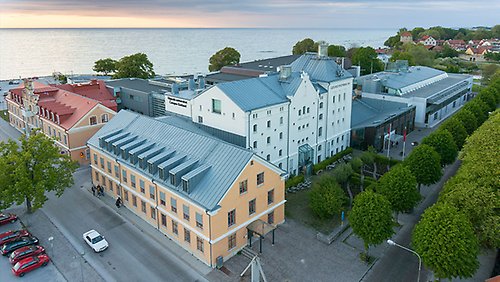Bachelor's Programme in Leadership – Quality Management – Improvement
180 credits

Would you like to lead and develop the companies and organisations of the future from a long-term sustainability perspective? The Bachelor's Programme in Leadership - Quality - Improvement will give you knowledge and tools for leadership and business development. You will study development based on social, ecological, and economic sustainability. The course applies a long-term perspective to business development where profit is not contingent on other stakeholders' losses.
Autumn 2024 Autumn 2024, Visby, 100%, On-campus, English
- Location
- Visby
- Pace of study
- 100%
- Teaching form
- On-campus
- Instructional time
- Daytime
- Start date
- 2 September 2024
- Language of instruction
- English
- Entry requirements
-
General entry requirements for first-cycle (Bachelor's level) studies in Sweden. Also required is advanced level mathematics (equivalent of Swedish courses Mathematics 3b or 3c).
Proficiency in English equivalent to the Swedish upper secondary course English 6. This requirement can be met either by achieving the required score on an internationally recognised test, or by previous upper secondary or university studies in some countries. Detailed instructions on how to provide evidence of your English proficiency are available at universityadmissions.se.
- Selection
-
Students are selected based on:
- their completed upper secondary (high school) grades (66%)
- Swedish Scholastic Aptitude Test (34%)
Students who have completed their upper secondary (high school) studies outside of Sweden are selected based on their upper secondary grades. Students who have completed their upper secondary studies and have taken the Swedish Scholastic Aptitude Test (only available in Swedish) are selected based on their upper secondary grades and their Scholastic Aptitude Test results.
Tuition fee-paying students and non-paying students are admitted on the same grounds but in different selection groups.
- Fees
-
If you are not a citizen of a European Union (EU) or European Economic Area (EEA) country, or Switzerland, you are required to pay application and tuition fees.
- First tuition fee instalment: SEK 65,000
- Total tuition fee: SEK 390,000
- Application deadline
- 15 January 2024
- Application code
- UU-K1460
- Additional information
-
Read more about Bachelor's level entry requirements and the application procedure.
About the programme
The Bachelor's Programme in Leadership - Quality Management - Improvement is geared towards those who want to work with development and improvement in companies and organisations. You will study development based on social, ecological, and economic sustainability. The programme gives you a broad knowledge of quality development and leadership. You will receive an industry-independent education with a focus on sustainable business development in close collaboration with trade, industry and other organisations.
During the programme, you will learn structured approaches and methods and gain a greater understanding of how organisations and companies operate. You can then use and further develop this knowledge to improve and maintain a high level of processes and work methods. The end goal is to sustainably increase efficiency and customer satisfaction within companies and other organisations.
Our previous students now work with titles such as project managers, validation engineers and quality development officers. Your future tasks might be to lead or participate in improvement and development projects, be responsible for and work with quality issues or work with other planning and management tasks.
The programme is given at campus Gotland, which offers an international environment with students from all over the world. Further, the focus on sustainable development is a common thread in all courses given at the campus.
Degree
The programme leads to the degree of Bachelor of Science with Industrial Engineering and Management as the main field of study.
Content
The programme is divided into six semesters, four with compulsory courses and two with elective courses. The foundation of the programme is compulsory courses in Quality Management where you study practices, methods and tools for Quality Development. You learn to systematically identify problems, analyse and improve processes and practices, and how to maintain these improvements in processes and practices.
Since much of Quality Development is carried out in project form, great importance is attached to project methodology and project management. Working with improvement and development projects involves working with or leading a group of people. Therefore, you will also study group dynamics and leadership, including conflict management, communication, diversity, and change management. This gives you a better understanding of how you, individuals and groups function, and how management problems associated with improvement and development work can be resolved.
During the two electives semesters (semesters three and four) you can apply for the courses that interest you. Half of those courses, 30 credits out of 60, must be in the same subsidiary field of study. We have suggestions for courses, as well as subsidiary fields of study, that we think complement our compulsory semesters well.
If you have studied 60 credits previously, you have the opportunity to take out your Bachelor's degree after only two years of full-time study.
Courses within the programme
Learning experience
The programme includes a variety of types of instruction, such as lectures, seminar exercises, self-study, assignments, laboratory exercises and projects based on real-life problems carried out at companies and organisations. You will work individually, in pairs and groups, in different constellations during the programme.
Guest lecturers are used throughout the programme to describe and communicate how activities and methods operate in practice. You will also be able to work on projects that are carried out in collaboration with host companies. In these, you will be able to apply your theoretical knowledge in practice. If you are a working professional, you will have the opportunity to do much of this application in your own organisation, which will have tangible benefits for your organisation.
Assessment is by means of exams, written tests, written assignments, oral presentations, laboratory exercises, seminars, and project work. An important element of the programme is to reflect on what you have learned through theory and its application, either by yourself or together with your fellow students.
Campus Gotland
As a student at the programme, you will be part of Uppsala University's most international environment: Campus Gotland. Here, you will study in small classes with students from all over the world, which will broaden your understanding of other cultures and prepare you for the international job market. At Campus Gotland, the focus on sustainable development is a common thread in all courses. The course and course literature are provided in English.
The programme is also available as an online-programme in Swedish.
Career
After the programme, you will be ready to work in both goods- and service-producing operations. Your future tasks might be to lead or participate in improvement and development projects, work as a project manager in change and improvement projects, be responsible for and work with quality issues, work as a Quality Development Officer, or work with other planning and management tasks.
A survey of students who graduated showed that 85% got jobs relevant to their education. Our former students work as:
- Quality Development Officers,
- Project Managers,
- LEAN Consultants,
- Validation Engineers.
Their employers include:
- ABB Robotics,
- PayEx,
- The Swedish Armed Forces,
- Region Gotland,
- Fertsoft,
- Air Liquide.
You can also choose to continue studying at the second-cycle level for a further two years in the form of a Master's degree. There are several possible second-cycle study programmes at Uppsala University, but your undergraduate education also allows you to study elsewhere in the world.
Career support
During your time as a student, UU Careers offers support and guidance. You have the opportunity to take part in a variety of activities and events that will prepare you for your future career.
Is this programme right for you?
Read interviews about the programme.

Study in Visby
What is it like studying at Campus Gotland?

Register your interest
Keep updated about the application process.

Programme syllabus
- Programme syllabus valid from Autumn 2024, version 2
- Programme syllabus valid from Autumn 2024, version 1
- Programme syllabus valid from Autumn 2023
- Programme syllabus valid from Autumn 2022, version 2
- Programme syllabus valid from Autumn 2022, version 1
- Programme syllabus valid from Autumn 2021
- Programme syllabus valid from Autumn 2020
- Programme syllabus valid from Autumn 2019
- Programme syllabus valid from Autumn 2018
- Programme syllabus valid from Autumn 2017
- Programme syllabus valid from Autumn 2016
- Programme syllabus valid from Autumn 2015
Contact
- For questions about the programme, please contact Mia Ljungblom:
- mia.ljungblom@angstrom.uu.se
- +46 18 471 83 78
- For admissions-related or general information, please contact the student administration:
- studentservice-cg@uu.se
Students
As a student you will find information about your studies in the student gateway.
